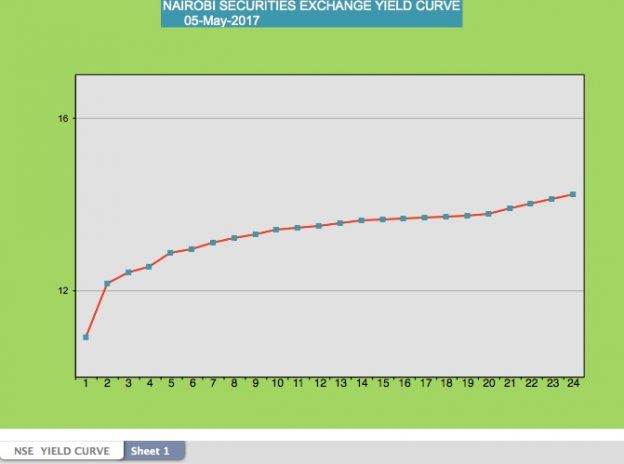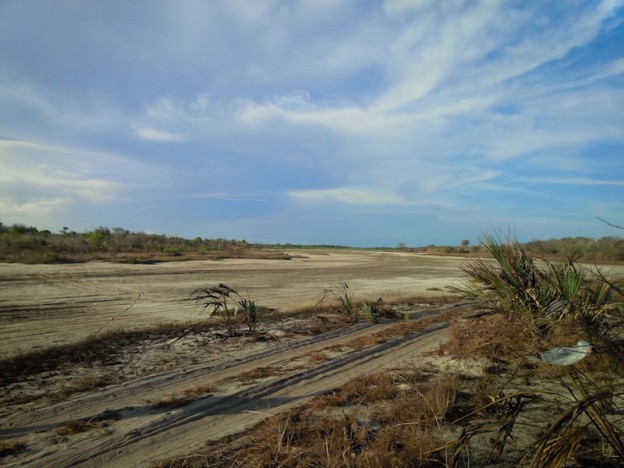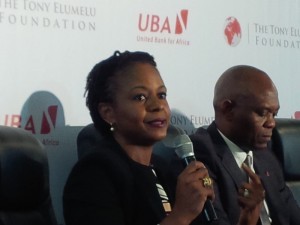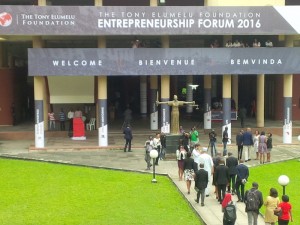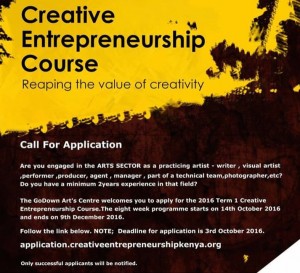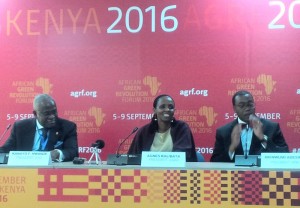Update on NSE Bonds or bonds listed at the Nairobi Securities Exchanges and other bonds, since the last bond moment in May 2015.
Globally, the bond market is bigger than equities one, and according to the latest CMA Kenya quarterly statistics (PDF), bond market turnover in Kenya has been larger than the equities one since 2009 mainly due to government bonds. In 2016, equity market turnover was Kshs 147 billion (down from 209 billion) in 2015. Bond market turnover was Kshs 433 billion (~$4.2 billion) in 2016 (up from 305 billion in 2015). Turnover has been 99% due to government treasury bonds, while that of corporates is less than 1% of bond turnover in a year – except in the years 2010 and 2011.
If one doesn’t want to buy NSE bonds directly, there are CMA-approved bond funds for investors including the Apollo Bond Fund, Co-op Bond Fund, Diaspora Bond Fund, Dyer & Blair Bond Fund, ICEA Bond Fund, Madison Asset Bond Fund, and the Old Mutual Bond Fund. These fixed income /bond funds total Kshs 1.4 billion (or 2.5% of the 57 billion) of funds under management by fund managers in Kenya.
Government Bonds
- M-Akiba: Following the successful launch of M-Akiba, Kenya’s Kshs 150 million, 10%, tax-free, 3 year bonds that were entirely sold via mobile phone (the minimum investment was Kshs 3,000 (~$30)) another Kshs 4.85 billion (~$47 million) is to be floated in June 2017.
- Following the launch of a green bonds program, banks, under the ambit of the Kenya Bankers Association (KBA), have partnered with Nairobi Securities Exchange (NSE) towards raising the country’s first bank-supported climate change-aligned corporate debt instruments in the next six to eight months. The capital flows from the green bonds in Kenya will go towards funding bank clients that require finance for clean and sustainable development projects in the priority areas of energy, agriculture, transport, infrastructure, building and urban planning, and water and waste management…so far, banks operating in South Africa and Morocco are already tapping the green finance opportunities in partnership with local municipalities and development finance institutions. projects. Also in South Africa, the World Bank’s International Finance Corp (IFC) successfully raised a 9-year, 1 billion Rand Green Bond via the Johannesburg Stock Exchange. More on the Kenya Bankers Association Sustainable Finance Initiative.
- The Kenya Government finance bill 2017 will give Islamic finance bonds the same treatment as conventional bonds and also allow Islamic finance products in the cooperatives sub-sector.
- The Rwanda government is about to issue a 10 billion Rwanda franc (~$12 million), 7-year Treasury bond. It will be issued on May 24 and the funds will be used for infrastructure project and capital markets development. The bonds will be listed at the Rwanda stock exchange and trade in multiple of 100,000 francs (~$120).
- Nigeria has asked Goldman Sachs & Stanbic IBTC Bank to advise it on the sale of a debut “diaspora bond” targeted at Nigerians living abroad. – via @kenyanwalstreet
Corporate NSE Bonds:
- Centum announced a Kshs 2 billion one year 14.5% note for the Two Rivers Development.
- Cytonn is seeking advisors for their medium-term notes to raise Kshs 5 billion from the public towards the financing of Cytonn real estate’s (CRE) projects including Taraji Heights in Ruaka and The Ridge in Ridgeways.
- On Monday EABL listed the Kshs 6 billion (~$58 million) of bonds at the Nairobi Securities Exchange (NSE) as the second and final tranche of its Kshs 11 billion shilling medium-term note program that was launched in 2015. The tranche attracted bids worth Kshs 8.4 billion, representing a 41% over-subscription. The bonds maturing in March 2022 will pay an annual fixed interest of at least 14.17% and the raised funds will go towards optimising operations and restructuring the brewer’s balance sheet. “This is the first corporate bond to be listed on the bourse this year, and we are confident that its success, a subscription rate of 140.9% will open the doors for more listings in the course of this year,” said Nairobi Securities Exchange CEO Mr. Geoffrey Odundo. Citi upgraded EABL as a buy, due to its low price – seeing value even as the beer market was flat. The first half of FY17 (ended December 2016) showed decent volume growth for EABL (+5% YOY) but weak sales growth (-6%) as beer demand continued to shift from mainstream to value. EABL is doing well in spirits but struggling in beer, and Tanzania continues to present a challenge. – Citi report.
- A South African credit-only micro-finance institution Real People Investment Holdings which issued a multi-billion bond in Kenya late 2015, has received a negative rating. Global Credit Ratings (GCR) said it had downgraded the primary and special servicer quality ratings assigned, with the outlook accorded as negative.
- Transcentury bondholders lost 50% in a restructuring buyout deal.
Other Bonds
- The African Development Bank had led the establishment of an African Domestic Bond Index and a $200 million African Domestic Bond Fund to deepen liquidity in local bond markets. It has also issued local currency bonds in 11 countries, including Kenya, South Africa, Egypt, Ghana, Nigeria, Botswana, and Uganda. leading the African Union in mobilizing domestic resources required to execute the Bank’s five developmental priorities dubbed the ‘High 5s’. – Light up and power Africa, Feed Africa, Industrialize Africa, Integrate Africa and Improve the quality of life for the people of Africa.
- The Africa Finance Corporation issued a US$500 million 7 year Eurobond. The senior, unsecured Eurobond which carries a coupon of 3.875% was priced to yield 4.000% and matures in April 2024. It attracted orders of US$2.4 billion, representing about 5 times over-subscription from 231 investors. The bond will be listed on the Irish Stock Exchange. The Eurobond was distributed to investors in Europe (29%), United States (25%), United Kingdom (24%), Asia (18%) and the Middle East (4%). Citi, J.P. Morgan, MUFG and Standard Chartered Bank acted as Joint Lead Managers and Bookrunners for the U.S. dollar-denominated issue.
- FSD Africa (Financial Sector Deepening Africa) and KfW Development Bank will invest £15.3 million (~$19.8 million or Kshs 2 billion) in the African Local Currency Bond Fund enabling it to step up its engagement with developmentally important industry sectors such as green energy and housing and take on investments in fragile and conflict-affected states. ALCBF is managed by Lion’s Head Global Partners (LHGP) Asset Management LLP.
- Bonds, Loans & Sukuk Africa “the continent’s only Pan-African debt event” takes place on 13th & 14th March 2018, at the Cape Town International Convention Centre.
